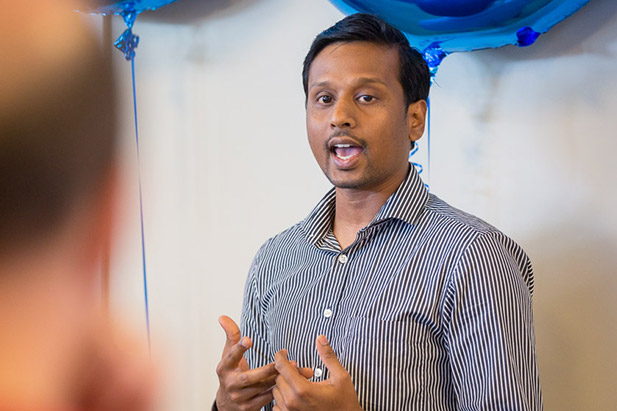Graduate programs a key component of university’s growth
Campus community celebrates the launch of the School of Graduate and Postdoctoral Studies
September 29, 2017

Looking back over the past 12 years, the University of Ontario Institute of Technology has experienced impressive growth in its graduate program offerings.
In 2005, 10 students enrolled in the university’s first graduate program, the Master of Information Technology Security. Fast forward to 2017, the university’s School of Graduate and Postdoctoral Studies (SGPS) now offers more than 40 master’s and doctoral programs, with 1,261 graduates and 623 master’s theses completed to date. The university is also home to 14 postdoctoral fellows.
On August 29, close to 100 faculty, staff and students gathered to celebrate the achievements of past and present graduate students, and to mark the formal launch of SGPS (previously known as the Office of Graduate Studies). They also received an update on current graduate program offerings, and heard about the experiences of master’s and doctoral students and postdoctoral fellows, including:
Ryan LePage, Master of Arts in Criminology student, Faculty of Social Science and Humanities
Ryan LePage decided to pursue graduate studies after earning his Bachelor of Arts (Honours) in Criminology and Justice from the university in 2016. Having worked closely with several faculty members, he notes many of them, such as hate crime and right-wing extremism researcher Barbara Perry, PhD, are in high demand for their expertise. He has also received opportunities to conduct research outside of his thesis project, gain experience as a Teaching Assistant, and benefit from partnerships between the university and community organizations.
Angela Skopyk, PhD candidate (Applied Bioscience), Faculty of Science
Angela Skopyk chose to pursue a doctoral degree at the university after meeting with Hélène LeBlanc, PhD, Undergraduate Program Director/Associate Professor in the university’s Forensic Science program, and learning about her research. Thanks in part to funding from the Canadian Queen Elizabeth II Diamond Jubilee Scholarship program, Skopyk was able to spend three months in Sydney, Australia, conducting human research trials alongside former University of Ontario Institute of Technology researcher Shari Forbes, PhD, Director of the Australian Facility for Taphonomic Experimental Research (AFTER).
Lalit Patnaik, PhD, Postdoctoral Fellow, Faculty of Engineering and Applied Science
Lalit Patnaik, PhD received his doctorate and Master of Technology in Power Electronics from the Indian Institute of Science in Bangalore, India, and Bachelor of Technology in Electrical Engineering from the National Institute of Technology in Rourkela, India. In January 2016, he joined the University of Ontario Institute of Technology as a Postdoctoral Fellow with the Smart Transportation Electrification and Energy Research (STEER) group, led by Sheldon Williamson, PhD, Canada Research Chair in Electric Energy Storage Systems for Transportation Electrification. Dr. Patnaik sees SGPS as a home on campus where postdoctoral fellows can focus on academics and research. He is also thankful for the research and teaching opportunities he has enjoyed at the university thus far.
Visit the SGPS website to learn more about graduate programs and postdoctoral initiatives.
Quote:
“This event offered members of the University of Ontario Institute of Technology community a glimpse into our graduate students’ success in research, achievements in competitions such as the Three Minute Thesis (3MT®), and recognition received through many different prestigious awards. All of this is something to celebrate. We are also proud to have 14 postdoctoral fellows, whose presence plays a crucial role in furthering research at our university. We look forward to seeing how the School of Graduate and Postdoctoral Studies contributes to the overall vision and mission of the university in the future.”
- Langis Roy, PhD, Dean, School of Graduate and Postdoctoral Studies, University of Ontario Institute of Technology
“It is a remarkable achievement for a new university like ours to establish so many credible and robust graduate programs so early in its history. This has played a big part in the University of Ontario Institute of Technology’s success in its formative years. The groundwork has been laid for tremendous progress in the future. The presence of graduate students on campus is good news for research, innovation and economic development for all of the eastern Greater Toronto Area—making the university a vital cog in the community wheel.”
- Aziz Douai, PhD, Assistant Dean, School of Graduate and Postdoctoral Studies, University of Ontario Institute of Technology



